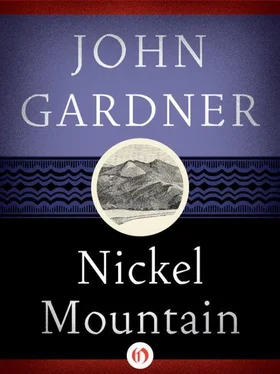“Storm’s getting worse and worse,” the man said.
“So I see.” He studied the bright red reflection of his cigarette in the windshield, wondering how far they’d come. After a moment he glanced over at the man. He was medium-sized, chubby, well-off-looking. A brown, heavy coat that might be English. Brown hair under the jaunty hat brim; probably bald on top. A flabby, effeminate face. He looked pleased with himself, pleased to be driving an Olds 98, helping some poor damn hitchhiker home to its mother.
“Going home for college vacation?” the man said.
Willard nodded, thinking: No. To visit my bastard son and my former whore. (But he wasn’t. Would dodge them, escape them.) He took another deep breath and closed his eyes, briefly.
“I thought so,” the man said, pleased. “I’m visiting my daughter. We always spend Christmas together.”
“That’s nice,” he said, all trace of irony suppressed. He drew on the cigarette and kept the smoke inside for a moment. “A family should keep in touch.”
The man glanced at him. After a moment, he smiled. “I always visit her at Christmas.”
Bringing presents, yes. Why, Daddy, how thoughtful of you to remember!
Sir, your daughter is pregnant. By a bicycle with the seat off. She’s afraid to mention it, for fear you might disapprove. I speak as your friend, sir. It’s only natural that a father would want to be informed. Panic rose in him, or claustrophobia. He remembered swimming in Lake George, driving up, up, up toward air unbelievably far from where it should be.
“Where are you in school?” the man asked.
“Albany.”
The man nodded as though that, too, pleased him, but he said, “I meant, what grade are you in?”
“I went to Cornell, the first year,” Willard said, “but I transferred.”
The man thought about it. “I see.”
“For the better living conditions.”
To live with a slut, sir. Luckily, your daughter is not a slut. Although she is going to deliver a bicycle. Part Roadmaster.
“The living conditions are better in Albany, you think?” He was torn between watching the virtually invisible road and squinting at Willard; he twisted his head from one to the other.
“Much better. Softer, if you know what I mean.” After a minute, he added, “There are two main conditions of living, hard and softer.”
The man laughed and nodded, then seemed to think about this, too, his head inclined to one side, face screwed up as if he’d bitten his tongue. Willard said, “What line are you in, exactly?”
“Actually,” the man said, “I’m in flowers.” After a second he explained, “ J. E. Jones’ Flowers, in Utica. You may have heard of it. Jones has been dead for years. I bought the business. My name’s Taylor. Actually, most people call me Jones.” He laughed. “I have a bank account under the name of Jones and another one under my other name. For personal checks. Saves confusion.”
“How about that,” Willard said. He added without thinking, meaning nothing, “I have two names too.”
“Oh?” The man was squinting at him again, suspicious.
But he was remembering Norma Denitz’s father. A psychoanalyst. He had curly brown hair parted down the middle, droopy eyes, a face as soft and pale as ass, fingers obscenely warm. He talked about patients, some man who’d put lye in his wife’s douche bag, knowing (for certain reasons, Norma’s father said) that she would never actually use it. He sat with a double martini in his pink, soft hand, wearing even in his own living room his obscene brown suit and vest, bow tie. Norma’s stepmother was wearing a shiny white dress cut so low you could see her ample and only virtues whenever she bent over. She was forty-eight, but she’d had her face lifted. They believed in The New Morality, but when Norma had stood up and stretched, holding the martini out to the side, as if for a toast, signaling him to come up with her — screw right under their noses — he could feel their anger like electric shock reverberating through the room, smile as they might. Hypocrites. He said abruptly:
“I imagine it takes a sharp man to make it with flowers.”
“Well,” the man said tentatively, “you have to be cut out for it, that’s true.”
The snowfall was as heavy as ever. The hills and trees blocked the wind and the snow dumped down as if from a giant shovel.
“That’s not what I mean. You have to know exactly what to buy, otherwise the whole mess would rot. You have to have enough but not too much, and then you have to talk people into taking it.”
“Well, yes,” the man said. “But actually—”
“And then, too, you’ve got to act interested in people. They graduate from grammar school and you’ve got to act like it’s really something, or Uncle Elmer dies and you’ve got to look sad, or some girl gets married—”
The man was looking hard at him, the car nosing toward the guard rail. He said, “I am interested in people. As I say, some people are cut out for it and some aren’t. It takes all kinds.”
“Oh sure, sure,” Willard said. He lit a new cigarette from the old one. “It’s a kick to talk to people sometimes — gives the ego a boost. But day after day, the same old. …” He stopped, looking at the guard rail in alarm. The man jerked the wheel and the car slid for a second, then straightened out again. It gave them both a scare, and for a while they were quiet. The radio played on, tinny, mechanically sentimental. The man sat back farther in his seat, driving still more slowly. They came to a town. There were no lights except, here and there, the snow-filtered light of a Christmas tree or an outline of colored lights around a porch. The big car moved through the town quickly, riding down the center of the deserted street. They jounced over a railroad crossing, then came into the open again, the highway a tunnel between snowplow drifts.
(It was right around Christmas the baby had come, three years ago. He’d been home, even had a vacation job at the Purina place; but he’d only stayed two days. After he’d gotten back to school, he’d gotten drunk and told them the whole thing, at the dorm. As soon as it was out he saw what he’d done. She was just some country slut to them, and what he’d done was of no importance. Only his misery was important. They turned it over and over, like a dead turtle, some of them laughing, some of them sympathizing, some sitting glum and embarrassed at his talking too much. After that he could hardly stand meeting them in the dorm halls. But it was all right. He’d transferred, and he’d never repeated his idiot mistake. He knew them now, all their talk about girls they’d laid, all their jabber about what buddies they’d always be.)
At last Willard said, “This must be a pretty heavy season for you. How come you can take off and visit your daughter?”
“Oh, I’ve got assistants,” the man said.
“You trust them?”
Again the man was looking at him, ignoring the road. He was beginning to be alarmed. “Certainly,” he said.
“Maybe you’re right,” Willard said. He could feel the nausea creeping back. “Crime does not pay. The easiest way to get ahead is to be honest. And we all want to get ahead, of course. Especially at Christmas.”
The man didn’t answer, and after half-a-mile Willard asked, his stomach churning badly now, “You do want to get ahead, don’t you, Mr. Jones?”
A second too late, having stopped to think about it first, the man laughed. “It takes all kinds,” he said. “That’s America.”
Willard Freund scrunched down in the seat, pushing his hands down into his pockets. The book was gone. He’d left it on the train. The smoke from the cigarette made him want to sneeze and burned his eyes like sulphur. Then suddenly, in a cloud of snow ahead of them, there were yellow lights. The man was squinting through the windshield, but he didn’t seem to be seeing. Snowplow, Willard thought. The danger is not where you think, Mr. Jones. I’m not going to knife you like a Commie rat, you’re going to get flattened against a mountain by a snowplow. That’s America. But even as he thought it, he was shouting, “Look out!” The man jerked the wheel in terror. The car slid sideways and the plowblade came flying down toward them like a wolf’s-head. The inside of the car was full of rushing light. He threw his hands up, trying to protect his head as they went into the collision.
Читать дальше











